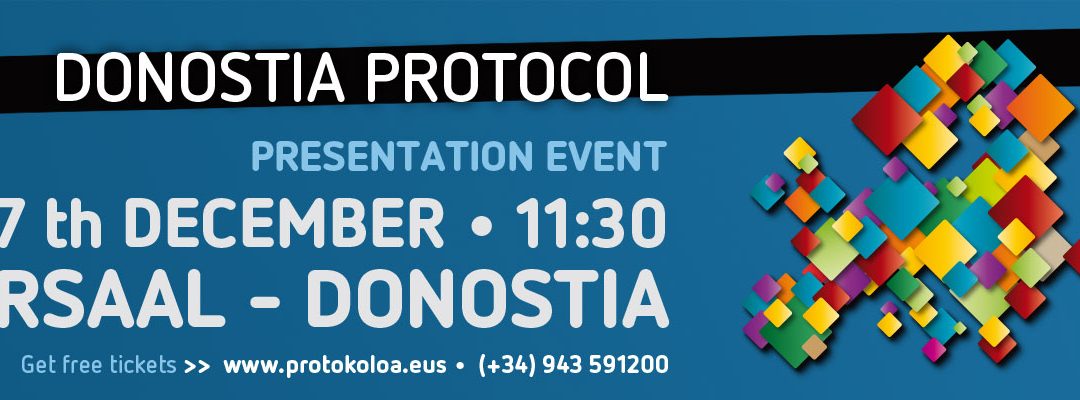On 17 December 2016 the Donostia Protocol, drafted by a committee of organisations including Linguapax, the Unrepresented Nations and Peoples Organization (UNPO), the Council of Social Organisations of the Basque Language (Kontseilua), the European Centre for Minority Issues (ECMI), PEN Translation and Language Rights Committee, the Centre Internacional escarre per a les Minories Etniques i les Nacions (CIEMEN), and the European Language Equality Network (ELEN), will be formally presented to the public in Donostia – San Sebastián.
The Protocol, which will conclude the extensive programme of Donostia as European Capital of Culture for 2016, will be sent to international organisations to act as a guideline to ensure language rights for minoritised language communities in Europe and beyond.
The launch event will be held at the Kursaal Palace in Donostia starting at 11am (CET) and will be broadcast live on: www.protokoloa.eus and HamaikaTB www.hamaika.eus
Language rights must be considered as a basic human right and mainstreamed into the European fundamental rights framework. For too long they have been treated as the latecomer to the human rights party. Languages are for communication, but cannot only be perceived as a vehicle of communication, since languages are intrinsic to culture. When the connection between languages and cultures is denied, the rights of the citizens are not considered. Therefore, supporting linguistic diversity acts to defend peoples’ rights. Furthermore, when such a channel is opened it contributes to ensuring social cohesion and peaceful co-existence, because nurturing language communities is one way of ensuring that all human rights are respected.
Throughout Europe linguistic communities have taken steps to enable people to live their lives in their own languages. There are hundreds of community-based organisations acting in different fields with the goal of supporting minoritised languages. The project of the Protocol to ensure language rights, the Donostia Protocol, proposes to create a meeting place where European civil society can take charge of the process of nurturing European linguistic diversity.
The project will be the beginning of a process undertaken by civil society, non-governmental organisations and specialists to establish a new proposal to ensure language rights collected in the Declaration of Human Rights. This document has the ambition to be a tool accessible to civil society from across Europe.
The Protocol is the outcome of a series of discussions conducted since 2014 by numerous groups; an instrument that brought together scientific perspectives, academic opinions and social viewpoints; and a novel foundation for building a new Europe based on equality between language communities. Therefore, the Protocol, which emerges from the project, will be taken to the international fora and institutions to allow organisations of all kinds to use it to regulate their commitment to language diversity.
The project was presented in five major Basque cities, and five different workshops were organised to study issues in different sectors, with around a hundred participants representing a variety of fields. This led to a phase of more intensive work through specialized sessions including representatives from workers organisations, the media, education, technicians, actors, writers, cultural figures, leisure activity organisers, trade unions, academics, information and communication technology experts and others.
The project was presented all over Europe with visits to Catalonia, Galicia, Ireland, Wales, Friesland, Flensburg, Brussels, Asturias, Norway and Estonia, with presentations elsewhere via video conference with organisations in Sardinia, Corsica, Brittany, Scotland and Friuli.
There were more than 400 contributions from civil society organisations that work for minoritised languages throughout Europe. A Scientific Committee added the final touches to the text of the resulting document, which consists of approximately 185 specific measures. The project was led by Paul Bilbao-Sarria ELEN Vice-President and Secretary-General of the Basque NGO Kontseilua.
December 17th will mark a new step forward on the road to the peaceful coexistence of different language communities. At the Kursaal Palace, Europe will receive from civil society a Protocol to Ensure Language Rights, an effective instrument to safeguard the rights of all linguistic communities in Europe, and an effective instrument for the development of minoritised languages.
ELEN Secretary-General Davyth Hicks worked on the Protocol’s organising and scientific Committee. In his speech (in Cornish) at the launch he will say that: “Throughout Europe, minoritised language communities, most of which are represented in ELEN, have taken steps to enable people to live their lives in their own languages. There are hundreds of community-based organisations acting in different fields with the goal of supporting minoritised languages.
“The Protocol to Ensure Language Rights that we will present on Saturday proposes to create a meeting place where civil society in Europe can take control of the process of nurturing our shared linguistic diversity. Join us so that we, together, using the Protocol, can work for our language rights, our human rights, for justice, for language revitalisation, and so as to bring meaning to the European slogan ‘United in diversity’.”
Video about the Protocol: https://www.youtube.com/watch?v=iqM043wRu7w
Information: http://protokoloa.eus/en/

